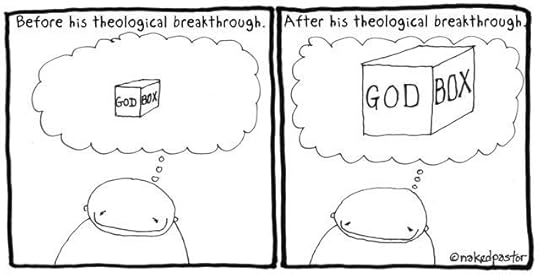How Big is Your God Box?
Several friends have initiated public discussions recently about whether an experience or revelation must be found in the scriptures in order for it to be from God. I’d like to share a couple of observations that may help readers settle these issues in their minds.
I have no reason to doubt the sincerity of people who ask such questions. I believe they’re simply trying to avoid error. I think there is great value in using the Bible as a plumb line for doctrine and experiences. The Bereans were known for searching the scriptures to determine if the things they heard were true. I try as much as possible to follow their example, but not all of my experiences with God and revelation I received from Him were ones I could easily find examples of in the Bible. Although I applaud those who want to avoid error, I’d like to point out some inherent flaws with this approach, that if not recognized, may lead to a different kind of error. Allow me to illustrate:
If I were to ask you if there were any green Ford trucks in the city of Appleton Wisconsin, how would you know for certain if there were any?
Even if you lived in Appleton all of your life and even if you knew the city better than anyone else, your knowledge would not be adequate to determine with absolute certainty whether a green Ford truck were located somewhere in the city. There is only one way to know for certain. You’d have to examine every square inch of the city before you could confidently say they were none.
The same problem exists when we attempt to determine if something is mentioned in the Bible. Many believers feel their knowledge of the Bible is complete enough to answer such questions—after all, what good Christian doesn’t know their bible? But before we can know with absolute certainty whether something is mentioned in the Bible, we’d need to examine every jot and tittle of the scriptures. And searching an English translation will not suffice. The scriptures were not originally written in English, but Greek and Hebrew. Many of the words used in the original languages have no equivalent English word. In some cases the words used to translate certain passages only render an imperfect (at best) and in some cases, a completely wrong meaning when compared with the original intent of the writer.
Unless you happen to be a Greek or Hebrew scholar, chances are your knowledge of the scriptures is not sufficient to say with certainty whether an experience can found in the Bible. And if you can’t say with certainty whether something is there, you can’t answer the question beyond a reasonable doubt.
Restrictions We Place on God
We all apply filters to revelation and experiences that allow us to judge certain things as being “from God” while others are judged as being “not from God.” The restrictions we place on experiences and revelation tend to define our views of God, and they place Him in a kind of theological box. Inside the box is that which we’ve judged to be of God and everything outside the box is not. The real question behind these discussions is how big (or how small) is the box you’ve created for God?

Some people prefer a God who is boundless, unfathomable, and at times, a bit unpredictable. They’re willing to accept God on His own terms, even if they don’t always understand Him or the things He does. Although they often deny it, they place limitations on God but their limitations are less restrictive than the limitations others might have. There God box is pretty big.
Some believers are concerned that Satan might be doing things that are attributed to God. These people need clear definitions, reasonable rules for interpreting experiences, and non-negotiable guidelines by which the things of God can be evaluated. They prefer to confine God to a sphere that is safer and somewhat smaller. It’s a good idea to have some type of system by which we evaluate revelation and experiences, but some ways of doing it are better than others.
One safety net employed by believers is to restrict the actions of God to only that which can be found in the scriptures. The problem with applying this filter is that most of us aren’t expert enough in the scriptures to determine whether some things are biblical or not. I would agree that when things are clearly and consistently taught in the scriptures, we should let that settle the debate. But there are many things that are not discussed in the Bible and many places where the Bible offers conflicting views on a subject, depending on which verses you look at.
One example is the fact that James wrote that we are saved by works, while Paul wrote that we are save by grace. Another example is the observation that there is “nothing new under the sun.” This observation, which is a quote from Ecclesiastes, was made by Solomon who was attempting to find the meaning of life apart from God. His search led to frustration and the conclusion that “all is vanity; a chasing after the wind.”
Because much of the book views life apart from God, Ecclesiastes is a poor place from which to build doctrine. As to whether or not there is anything new under the sun, in the book of Revelation God says, “Behold, I make all things new.” Here is a case where we have two verses of scripture in conflict with one another. One was made by a man seeking wisdom apart from God, and the other was God’s reply.
There are many conflicting passages found in the Bible and that creates a problem if it’s the only thing we’re using to determine whether an experience is from God. We may be misled if we fail to consider things like the context of a passage and what other passages on the same subject have to say.
Another safety net some Christians use is to define God in terms they can understand. This view is often expressed in statements like, “I can’t understand why God would need to do so and so…” What is revealed in these statements is the fact that some people need to understand the motives behind everything God does, and only that which seems logical (to them) is allowed. If they can’t understand something, it cannot be of God. (This is despite the Biblical admonition that we should not rely on our own understanding.)
Is There a Better Way?
Rather than evaluating experiences and revelation by our imperfect knowledge of scripture, or by what we can understand, we might instead use the method that was prescribed by Jesus.
Jesus taught that a good tree cannot bear bad fruit, nor can a bad tree bear good fruit. Similarly, He taught that a pure spring cannot give polluted water nor can a polluted spring give pure water. A tree bears fruit according to its nature. Likewise a spring gives water according to its nature. The origin (or nature) of an experience can be evaluated by examining the fruit that it bears.
If an experience is from God it will bear the fruit of the Spirit of God. According to Jesus, it cannot bear any other kind of fruit. These experiences will produce things like love, peace, joy, and kindness in the people who have them. If the fruit of the Spirit is not being produced we have reason to doubt that they are from God.
In case you’re wondering, in no way am I trying to undermine the authority of the Bible. I believe that the scriptures in their original language are inspired and authoritative on the issues they address. But the Bible is not a complete description of everything God has ever done or that He ever will do. I’m not suggesting that we should not use the Bible to validate our experiences. I’m only suggesting that we should not limit the validation process exclusively to the Bible. Examining the fruit that comes from an experience or revelation is just as valuable as examining what the scriptures have to say about it.



